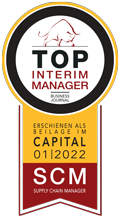

Richard Porstmann
Supplier selection and influence on purchasing and costs
Reading time: 12 minutes
Table of contents
A solid supplier relationship is an essential building block for the long-term success of a company.
It not only influences the efficiency and reliability of the supply chain, but also makes a decisive contribution to innovative strength and competitiveness.
But how do you build a successful supplier relationship, what are the benefits for the supplier and how can you ensure a long-term win-win situation?
In this article, we look at these aspects and show how a sustainable and mutually beneficial collaboration can be created.

How do you build a strong supplier relationship?
Building a successful supplier relationship begins long before the first contract is signed.
The process requires careful planning, clear communication and the desire to develop a collaborative partnership.
- Early involvement and transparency: Potential suppliers should be involved in the development and planning processes at an early stage during the selection process.
This promotes an understanding of the company’s needs and creates the basis for a cooperative relationship.
Transparent communication about expectations, requirements and challenges is essential here.
- Building trust: Trust is the foundation of any stable business relationship.
It is created through reliability, open communication and adherence to agreements.
Regular meetings and an open dialog help to avoid misunderstandings and put the relationship on a stable footing.
- Long-term perspective: Suppliers should not just be seen as short-term cost factors, but as long-term partners who contribute to the success of the company.
A long-term perspective when drafting contracts and the willingness to invest in the relationship are crucial here.

What does the company gain from a good supplier relationship?
A successful supplier relationship brings the company numerous benefits that go far beyond mere cost savings.
It creates the basis for a stable and efficient supply chain and can make a decisive contribution to strengthening competitiveness.
- Increased security of supply: A strong supplier relationship ensures that the company is reliably supplied even in times of market fluctuations or supply bottlenecks.
This reduces the risk of production interruptions and enables better planning security.
- Improved product quality: Committed suppliers who view the company as a long-term partner are more willing to meet high quality standards and continuously improve them.
This helps to ensure the quality of the end products and increase customer satisfaction.
- Cost efficiency and promoting innovation: Trusting cooperation with suppliers makes it possible to work together to optimize costs and increase efficiency.
In addition, the company can benefit from the supplier’s innovative impulses, which in turn improves its own products and services.
- Competitive advantages: Companies that maintain strategic partnerships with their suppliers can secure competitive advantages through exclusive supply contracts, early access to new technologies or better payment terms, which can be decisive in highly competitive markets.

How do you measure a successful supplier relationship?
A successful supplier relationship cannot be measured solely by adherence to contracts or delivery deadlines.
There are several qualitative and quantitative key figures that reflect the quality of the relationship.
- Supplier evaluations: Regular, structured assessments of supplier performance based on key performance indicators (KPIs) such as price level, delivery reliability, quality and flexibility are important.
However, these KPIs should be supplemented by “soft” factors such as the supplier’s willingness to cooperate and ability to innovate.
- Feedback loops: A mutual exchange of feedback is essential.
Not only should the supplier’s performance be addressed, but also the company’s own behavior towards the supplier.
This feedback helps to continuously improve the collaboration.
- Satisfaction and commitment: The satisfaction of both sides in the collaboration is a key factor for long-term success.
Signs of this include, for example, the supplier’s willingness to proactively make suggestions for improvement or their commitment to joint projects.

How can a long-term win-win situation be achieved?
The aim of every supplier relationship should be to create a sustainable win-win situation in which both parties benefit in the long term.
To achieve this, several factors are crucial.
- Mutual benefit: A win-win situation is based on the understanding that both sides must benefit from each other.
This means that not only cost aspects, but also strategic goals and innovation potential are considered in the collaboration.
- Flexibility and adaptability: Markets and requirements are constantly changing.
A successful relationship is characterized by the ability of both sides to adapt flexibly to new conditions and find solutions that are beneficial to both parties.
- Shared vision and goals: A shared vision and agreed objectives are crucial to ensure long-term cooperation.
Regular strategic meetings in which these goals are reviewed and adjusted if necessary are helpful here.
- Sustainability: Sustainability is not just a trend, but a key aspect for long-term success.
Companies should choose suppliers who share their values in terms of environmental and social responsibility.
This creates a basis for a stable and future-oriented partnership.

How can an interim manager support the company in supplier relations and reduce costs?
An interim manager plays a key role in shaping supplier relationships in such a way that they not only become more efficient, but also more cost-effective.
Through my expertise and targeted approaches, I can make a significant contribution to reducing purchasing costs and thus improve the company’s margins.
- Cost optimization through strategic supplier selection: As an interim manager, I analyze existing supplier contracts and identify potential savings.
By realigning the supplier strategy or identifying alternative, more cost-effective suppliers, I can negotiate significant price reductions.
These strategic measures, combined with good supplier management, lead to direct savings in purchasing and improve the company’s margins.
- Negotiating skills and better conditions: An experienced interim manager has excellent negotiating skills.
I use my experience to achieve better conditions in negotiations, be it through more favorable prices, extended payment terms or better delivery conditions.
These improved contractual conditions, supported by good supplier management, contribute directly to reducing procurement costs and increasing profitability.
- Optimization of the total cost of ownership (TCO): I not only look at the pure acquisition costs, but also optimize the entire life cycle of the products and services purchased.
By selecting suppliers that offer low long-term operating costs, high reliability and low failure rates, we help to reduce the total cost of ownership.
This leads to a sustainable reduction in costs and increases margins in purchasing.
- Increased efficiency through process optimization: By implementing efficient purchasing and logistics processes, my work ensures that fewer resources are wasted.
For example, warehousing costs could be reduced by promoting just-in-time deliveries, or automation in purchasing can be driven forward to reduce administrative costs. Good supplier management helps to implement these measures effectively, which reduces operating costs and ultimately improves the company’s profit margin
- Risk minimization and cost savings: Another aspect that the interim manager helps with is risk minimization.
By identifying risks in the supply chain and developing risk reduction strategies (e.g. through dual sourcing or contingency plans), I can help prevent costly supply failures and production interruptions.
Reducing such risks leads to lower unexpected costs and more stable margins.
Targeted support from an interim manager can therefore not only increase the efficiency and reliability of the supply chain, but also generate substantial savings in purchasing.
These measures improve the company’s margins and make a decisive contribution to increasing competitiveness. If you have any further questions, I will be happy to assist you and go through this process with you!
Conclusions
-
Early involvement and transparent communication: Involving suppliers as early as the selection process and transparent communication are key to building a strong supplier relationship.
-
Building trust: Trust is the foundation of a stable business relationship and is created through reliability, open communication and adherence to agreements.
-
Long-term partnership: Suppliers should be seen as long-term partners who contribute to the company’s innovative strength and competitiveness.
-
Advantages for the company: A solid supplier relationship leads to increased security of supply, improved product quality, cost efficiency and competitive advantages.
-
Measuring the supplier relationship: A successful supplier relationship is evaluated by KPIs, feedback loops and the satisfaction of both parties.
-
Role of the interim manager: An interim manager can achieve significant cost savings and efficiency gains through strategic supplier selection, negotiation skills and process optimization.
If you have any suggestions or thoughts on this topic, please write to me.






